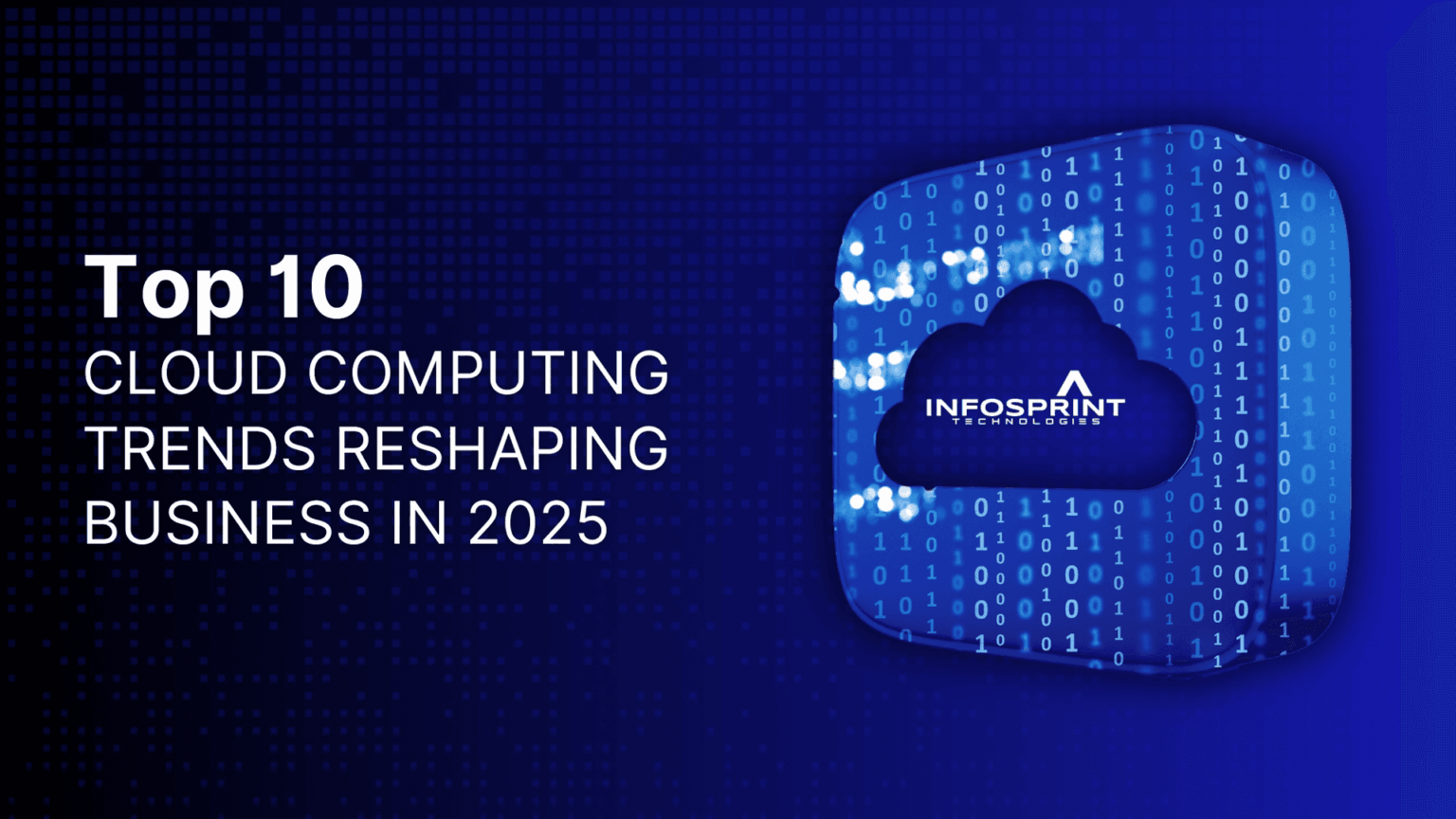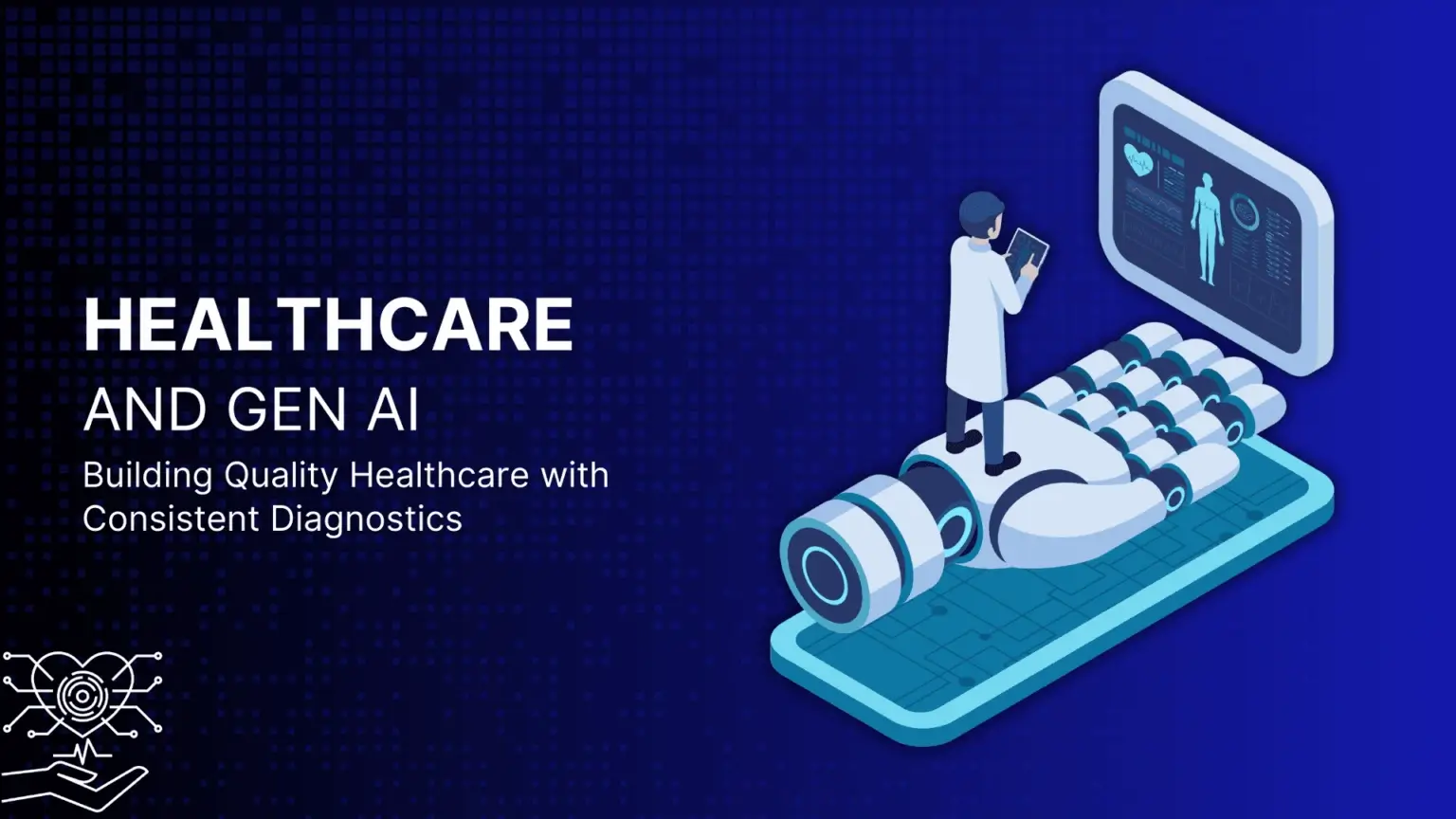How Quantum Computing Will Revolutionize Cloud Services in 2025: A Glimpse into the Future

Quantum computing technology is still in the development phase and has not yet been adopted across organizations globally. Still, it’s one of the trending technologies that will shape how organizations solve complex problems. This technology will revolutionize and bring new opportunities to all industries.
When combined with cloud computing, it signifies a watershed moment in technology. As quantum computing advances from theory to practice, potential integration with cloud services is poised to revolutionize the digital environment.
Infosprint Technologies, an IT company, is actively working with quantum computing technology and its integration with cloud services. In this blog, we’ll explore how quantum computing is set to impact cloud computing by 2025—highlighting key opportunities, challenges, and transformative possibilities.

What is quantum computing?
Quantum computing applies the concepts of quantum mechanics to perform calculations that exceed the capabilities of classical computers. In contrast to ordinary computers, which employ bits to process information, quantum computers utilize qubits—quantum bits—that can exist in multiple states simultaneously. This enables quantum computers to solve problems much faster and more efficiently.
Its vast applications range from drug discovery and enhancing financial models to developing new materials and securing organizational data. Quantum computing is not just a concept for the future; it is a present reality expected to bring significant disruption in 2025.
The current landscape of quantum computing and cloud computing
Quantum computing leverages quantum mechanics to solve complex problems. Unlike traditional computers, Quantum computers use qubits, which can be in numerous states at the same time, as opposed to binary bits. IBM, Google, and Rigetti have made tremendous progress in the development of quantum computing, and their quantum processors are approaching practical applications.
Meanwhile, cloud computing, which gives on-demand access to computer resources, has become the foundation of modern IT design. AWS cloud services provider offers scalable, secure, and cost-effective services to support organizations in data storage, artificial intelligence, and the Internet of Things.
How quantum computing will transform cloud computing?
Quantum computing’s ability to solve complex problems faster will significantly cloud computing. The cloud service providers will integrate cloud computing with quantum resources to enhance their services.
Enhanced computational power
- Logistics, finance, and healthcare applications can benefit from faster and more accurate computations.
- Quantum computing can process vast datasets more efficiently, reducing the time needed to train AI models.
- Additionally, quantum algorithms will enhance encryption, ensuring more secure cloud environments
Democratization of quantum computing
- Cloud providers bear the costs of creating and maintaining quantum computing resources, allowing customers to pay only for the needed resources. This makes these services affordable and accessible.
- A user-friendly interface on cloud platforms will significantly benefit users by enabling them to utilize quantum computing features without investing in complex hardware or specialized expertise.
- Additionally, cloud platforms make quantum computing accessible from anywhere with an internet connection.
Synergy with artificial intelligence
- Quantum computing excels at processing complex data and identifying intricate patterns. This capability allows AI modules to analyze real-time data, optimize complicated systems, and develop more accurate predictive models.
- Furthermore, quantum algorithms can speed up the training process for machine learning models, allowing them to learn faster and adapt more effectively to new data.
- Moreover, quantum computing can significantly speed up unstructured data processing, such as text, images, and videos. It also enhances the performance of chatbots and virtual assistants.

Save Weeks of Analysis
Real-World Applications of Quantum-Cloud Integration
1. Healthcare and Drug Discovery
Quantum computing’s ability to simulate molecular interactions at a granular level will revolutionize drug discovery. Cloud-enabled quantum computing can:
Speed up the identification of effective drug compounds.
- Quantum computing creates simulations to understand the behavior of molecules, which is crucial for understanding how drugs interact with biological targets.
- By understanding the molecules, they can predict the side effects of the drug and design more effective drugs.
- These simulations can significantly accelerate the drug discovery process, reducing the cost and time associated with trial and error.
Optimize medical imaging processes for accurate diagnostics.
- Quantum computing technology can enhance medical images such as CT scans and MRIs.
- It accelerates image processing by analyzing large datasets, which is crucial in emergency medicine.
- Quantum computing can help personalize treatment plans by analyzing individual patient data, leading to more effective and targeted therapies.
2. Financial Services
The financial services sector stands to gain significantly from integrating quantum computing via cloud platforms.
Portfolio optimization:
- With their inherent parallel processing capabilities, Quantum computers can quickly evaluate significantly more complex investment scenarios.
- They can identify optimal asset allocations that balance risk and return more effectively.
- Additionally, their robust investment strategies are better equipped to withstand market fluctuations.
Fraud detection:
- Quantum algorithms are excellent at detecting small patterns and irregularities in financial data that could suggest fraudulent conduct.
- Improve fraud prevention by proactively identifying and mitigating risks.
Risk analysis:
- Quantum computers can provide faster and more accurate risk assessments.
- By incorporating more variables and considering more complex interactions, they improve the accuracy of risk predictions.
- They improve risk management tactics, allowing financial organizations to make better judgments and reduce possible loss.
3. Climate Modeling and Sustainability
Quantum computing’s unparalleled processing power holds immense promise for tackling the pressing challenges of climate change. When combined with the accessibility and scalability of cloud platforms, it can revolutionize how we understand and address environmental issues.
Predict environmental changes more accurately.
- Quantum computing can Incorporate more variables and interactions into climate models, leading to more accurate predictions of future climate scenarios.
- Improve the representation of key processes such as ocean currents, cloud formation, and ice sheet dynamics for better climate understanding.
- They also assess the impact of mitigation strategies such as carbon emission reduction and geoengineering techniques.
Develop sustainable energy solutions through material optimization.
- Quantum computing can enhance the development and discovery of new materials for sustainable energy technologies.
- Quantum simulations can enhance battery technology by providing higher energy density, extending lifespans, and enabling faster charging times.
- Quantum computing can help design more efficient catalysts for hydrogen production and carbon capture processes, facilitating cleaner and more sustainable energy sources.
4. Retail
Retail cloud computing will benefit from quantum-cloud integration through enhanced capabilities such as:
Dynamic pricing optimization:
- Quantum computing can track changes in customer demand based on time of day, seasonality, promotions, and competitor pricing.
- Adjust prices based on real-time stock levels to maximize revenue and minimize markdowns.
Personalized customer experiences:
- Quantum-powered AI can examine client data in unprecedented detail, revealing subtle trends and preferences that traditional approaches may overlook.
- It may generate highly individualized marketing campaigns and product suggestions based on each customer’s needs and interests..
- It delivers more relevant customer experiences, builds stronger customer relations, and drives loyalty.
Inventory management:
- Quantum computing can optimize inventory levels, ensure the right amount of stock is always available, and minimize stockouts and excess inventory.
- By precisely estimating demand, businesses may reduce the risk of ordering too much inventory, particularly for perishable commodities.
- By utilizing quantum computing, retailers optimize their entire supply chain from suppliers to store and store to customer.
5. Government Sector
Governments will use quantum computing via cloud platforms for several vital applications, altering how they run and serve their population.
National security:
- The government uses quantum-powered research to develop and implement “post-quantum cryptography” algorithms, which ensure the security of sensitive data, communications, and national infrastructure.
- Quantum computers can better recognize and neutralize cyber risks, providing proactive security against complex attacks.
- Quantum-enhanced data analysis can help intelligence agencies extract valuable insights from vast information.
Urban planning:
- It analyzes real-time traffic data to predict congestion spots and optimize traffic signal timings to minimize delays.
- Quantum computing can assist in optimizing public transportation routes, scheduling, and resource allocation, increasing efficiency and shorter travel times.
Disaster response:
- Quantum computers can improve the accuracy of natural disaster predictions through realistic simulations.
- By enhancing predictive capabilities, early warning systems can facilitate timely evacuations and mitigation efforts.
Exploring the Future of Quantum-Cloud Computing
The integration of quantum computing into cloud platforms by 2025 is set to usher in a new era of technological opportunities. While challenges remain, the synergy between these technologies promises significant advancements across various industries. Businesses must prepare for this paradigm shift by leveraging quantum-cloud capabilities to stay competitive in an increasingly complex digital marketplace.
The combination of quantum computing and cloud computing has the potential to revolutionize creativity by providing solutions to previously unsolvable problems. As we approach this exciting future, technology leaders must address the challenges while realizing the possibilities presented by this groundbreaking convergence.
Ready for the Future of Cloud Solutions?
As quantum computing transforms cloud services, your business needs to stay ahead of the curve. At Infosprint Technologies, we are helping organizations harness the power of quantum-cloud integration. Contact us today to learn how we can help you prepare for the next wave of digital transformation.
Related Posts

Top 10 Cloud Computing Technologies to Look Out for in 2025





